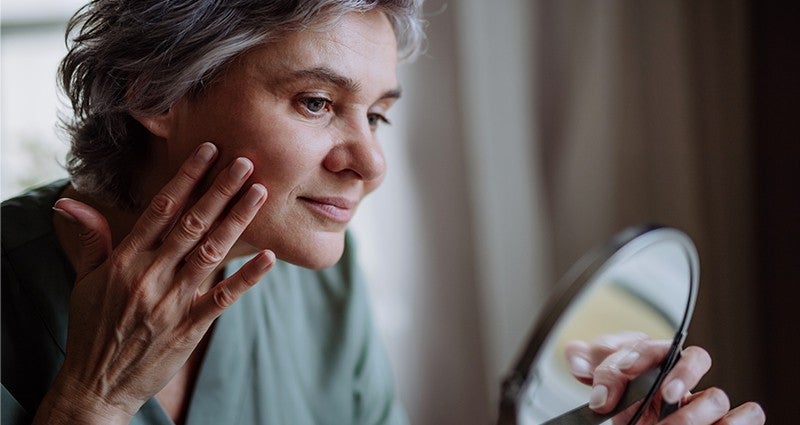Seeing red? How to live with rosacea

If you’re living with rosacea, you may experience a number of challenges. The condition can affect much more than just the skin. It can affect emotions and behavior. The good news is there are things you can do to make rosacea easier to manage.
What is rosacea?
Rosacea is a common skin condition.1 It affects more than 14 million people in the U.S.1 People who have rosacea blush or flush more easily than others. The most visible sign is a red face.
It is a chronic condition without a cure. And it most often affects people with fair skin, especially females. It rarely affects children and adolescents. People with rosacea usually start seeing signs of it after they turn 30.
Rosacea is mostly harmless and not contagious. But, severe and untreated cases can lead to disease progression and a worsening skin condition.
What does rosacea look like?
There are many signs and symptoms, and four different types of rosacea. People can have more than one type.1
Rosacea symptoms include:1
- Ongoing facial redness, oiliness
- Flushing—facial redness that comes and goes
- Blood vessels you can see—thin, red lines on the skin
- Solid, red, small bumps that look like acne
- Dry, bumpy, rough or scaly skin
- Red and watery or dry and itchy eyes and swollen eyelids
- Blurry vision, light sensitivity
- Thickening of the skin of the face or on the nose, which can lead to an enlarged appearance called rhinophyma.1
- Raised, red patches
- Swelling, burning, stinging or itchiness
Rosacea symptoms can appear on your:1
- Cheeks
- Forehead
- Eyes
- Nose
- Chin
- Ears
- Neck
- Scalp
- Chest
Think you might have rosacea? We can help you find out for sure.
How rosacea affects your overall health
Rosacea can do more than just affect your physical body. It can affect the way you feel about yourself. You may feel exposed and like there is nowhere to hide.
Studies have shown that people with rosacea may experience:
- Feeling anxious, down or worried
- Embarrassment, frustration and a tendency to avoid social situations
- Low self-confidence and self-esteem
- Problems with interactions at work or poor attendance
But, studies also show that people with rosacea can live better with treatment. If you’re looking for total body care, try our General Medical service. You can connect with us 24/7 by phone or video. And, you’ll get quality care from licensed healthcare professionals.
Get relief from rosacea
There is no known cause for rosacea. You cannot prevent it. But, you can reduce your risk of a flare-up, get better treatment results and prevent symptoms from worsening.2 Simply know what triggers it. Then, avoid the triggers.
Know the triggers:2
- Hot or cold temperatures
- Sun exposure
- Alcohol
- Spicy foods
- Makeup, skin and hair products, especially with fragrance
- Stress
- Some medications
Treatments are available
Many people who use prescribed medications can get relief from mild symptoms. The same is true for people who use over-the-counter creams, gels and lotions.
If you’re thinking about treatment, be sure you consult with a medical provider first. Diagnosis is the first step. Teladoc Health Dermatology makes it possible for you to get a custom treatment plan in 24 hours or less. Learn more about our dermatology service.
How to use Teladoc Health Dermatology:
- Upload photos of your skin issue Start an online review with a board-certified dermatologist to get help for rashes, sunburns, skin infections, moles and more. No video or phone call with the doctor is needed.
- Get a custom treatment plan in 24 hours or less Receive your dermatologist’s diagnosis and treatment plan via your Teladoc Health messaging center. Prescriptions, if needed, can be sent to your pharmacy of choice.
- Ask a follow-up question, if needed Send a follow-up message to your dermatologist online or in the Teladoc Health app for up to 7 days after your review.
1https://www.aad.org/public/diseases/rosacea
2https://www.aad.org/public/diseases/rosacea/triggers/find
Was this article helpful?
Don't wait! Unlock a healthy, happy new year, at no cost to you.
This content is not intended to be a substitute for professional medical advice, diagnosis or treatment. Always seek the advice of your physician or other qualified health provider with any questions you may have regarding a medical condition.
